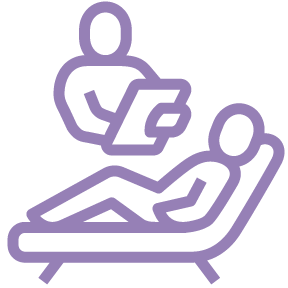
Integrative Psychotherapy
Virtually or on-site, we’re here for you.
Integrative Psychotherapy is a predominantly Telehealth-based practice, with patients in both New York and California.
In-person sessions are available upon request in Manhattan’s Nomad District. The office is located at 245 Fifth Avenue, 3rd Floor, Manhattan, New York.
Cheryl Hochberger, LCSW, CHC, the primary psychotherapist, is a Licensed Clinical Social Worker and Certified Holistic Health and Wellness Coach. She is licensed to practice psychotherapy in both New York and California. She has been working in the field of health and wellness since 2006.
What we do
We specialize in eating disorders, compulsions, addictions, family counseling, lifestyle issues, and holistic wellness.
- Eating Disorders
- Anxiety & Depressive Disorders
- Mood Disorders
- Sexual Dysfunction & Gender Dysphoria
- Family Therapy & Couples Counseling
- Holistic Wellness Couseling
Eating Disorders

Eating Disorders are characterized by a continuous disruption of eating behaviors that significantly impact physical health or psychological functioning. There are various diagnoses within the eating disorders category that consist of different sets of behaviors.
- Anorexia
- Bulimia
- Binge Eating Disorder
- Body Image Issues
Anxiety & Depressive Disorders

Anxiety and Depressive Disorders are characterized by a change in how we think, feel, and behave. They may cause physical symptoms, such as sweating, trembling, dizziness, heart palpitations, chest pain, and difficulty breathing.
- Generalized Anxiety Disorder
- Major Depressive Disorder Bulimia
- Trauma and Stress Related Disorders
- Obsessive Compulsive Disorder
Mood Disorders

Mood disorders include serious changes in mood that may be so strong that they interfere with a person’s ability to work, study, sleep, or eat. These disorders are different from the normal ups and downs that everyone experiences from time to time.
- Bipolar 1 & 2
- Attention Deficit/Hyperactivity Disorder
Sexual Dysfunction & Gender Dysphoria

Sexual dysfunction and gender dysphoria are two separate but related conditions. Sexual dysfunction refers to a problem with sexual desire or performance, while gender dysphoria is a condition in which a person experiences discomfort or distress due to their biological sex not matching their gender identity.
- Sexual Dysfunctions
- Gender Dysphoria
Family Therapy & Couples Counseling

Family Therapy explores the patterns that develop in familial relationships and the way each member of a family system impacts the others. Family therapy may require the participation of one’s significant other, parent, or siblings.
- Family Therapy
- Couples Counseling
Holistic Wellness Counseling

Holistic Wellness Counseling is an integrative approach to therapy that accounts for emotional, physical, mental, and spiritual factors that affect mental and physical well being.
- Emotional
- Mental
- Spiritual
- Physical
Our Methods
Diverse techniques to help guide you through life
Integrative Psychotherapy uses various psychotherapeutic techniques and healing tools. The techniques and approaches are tailored to the needs of each individual patient, couple, or family unit. Most of the techniques used are based on evidence-based practice.


Psychodynamic Psychotherapy & Psychoanalysis
Psychodynamic Psychotherapy and Psychoanalysis examines how family history and childhood patterns impact adult cognition and behavior.
Mindfulness
Brings awareness to the present moment. It’s about learning to tune into a different station, switching from a negative to a positive frequency, and recognizing that one is in control of their own mind.
Cognitive Behavioral Therapy
This therapy develops a fundamental understanding of what mental processes create specific behaviors and offers tools to deconstruct the thoughts that created them, in effect changing behavior.
Family Therapy and Internal Family Systems
Family Therapy and Internal Family Systems looks at patterns that develop in familial relationships and the way each member of a family system impacts the others.
Attachment Theory Therapy
Attachment Theory Therapy is based on clinical studies that demonstrate the effect a parent’s behavior towards their child has on the child’s emotional development.
Existentialism
Existentialism examines the nature of existence itself and possibilities that exist outside the realm of one’s knowledge and understanding as a human being.

Licensed in the state of New York & California
Why us?
We’re human too.
We’ve all been there.
Cheryl Hochberger, LCSW, CHC, the primary psychotherapist, is a Licensed Clinical Social Worker and Certified Holistic Health and Wellness Coach. She is licensed to practice psychotherapy in both New York and California. She has been working in the field of health and wellness since 2006.
Ivy League
Educated
10+
Experience Years
Integrative
+ Holistic Practices
East/West
Philosophies Used
Client Testimonials
What our clients say

Eugene F.
“Cheryl really took the time to understand my background and habits to discover the root cause of my behaviors. She was never judgmental, was willing to listen, and …”

Kelly C.
"Cheryl is an incredible therapist. Extremely attentive, insightful, and honest, she listens and provides useful feedback that helps me manage my emotions…"

Melissa M.
“I am grateful for Cheryl’s help in overcoming my anxiety and depression. During our sessions she not only listened to me without judgment, but also…”
Names have been altered to protect patient identities.
Still have questions? Call us.
Frequently Asked Questions
Where will I meet with my therapist?
The practice has shifted to mostly Telehealth appointments with limited availability for in person office visits upon request. Telehealth sessions will be conducted via video chat or phone call. In person appointments can be requested at the Flatiron office located at 245 Fifth Avenue, 3rd Floor. Telehealth and In-Person Office Hours are Monday – Friday 8am – 9pm EST.
What should I prepare before my first psychotherapy session?
Patients should fill out all the required online forms via the patient portal, which the patients will be given access to prior to the scheduled intake appointment.
What can I expect from my first psychotherapy session?
The first appointment generally takes about an hour. Sessions thereafter are forty-five minutes. The initial intake session covers health and family history, current symptoms and goals for therapy. Once an initial intake session is conducted, the therapist will evaluate the patient’s symptoms and create a treatment plan for each individual. The patient should expect to gain clarity on their diagnosis and their prognosis for therapy.
What are the goals of psychotherapeutic treatment?
The goals of treatment are to develop greater self-awareness and understanding of one’s cognitive and behavioral patterns, so the individual may make positive changes in their lives. Therapy will address all aspects of an individual’s life that contribute to their personal well being including: self esteem, family and personal relationship dynamics, romantic relationships, and career direction. Holistic psychotherapy will do this by addressing the emotional, physical, mental, and spiritual causes of psychological disorders.
I’ve never been to therapy, what should I expect from psychotherapy sessions?
One should develop an awareness of maladaptive cognitive and behavioral patterns, and learn to break these patterns and develop a metaphoric mental tool kit to shift to thoughts and behaviors that are healthy. These tools can help patients eliminate compulsions and addictions that wreak havoc in their lives. Patients may experience transformative changes in their lives that will reduce stress and enhance their well being such as: elevated self confidence, clarity of purpose and life direction, improved relationships, and increased motivation.
How long should I expect my psychotherapeutic treatment to last?
The length of treatment is based on the initial treatment plan and generally involves weekly or biweekly treatment for a period of time, which will be determined by therapist and patient. The length of treatment depends on the severity of symptoms and the speed at which an individual is able to implement psychotherapeutic changes.
Is psychotherapy completely confidential?
All sessions are confidential. Confidentiality protects a patient’s privacy and allows an individual to share person information freely and openly. A patient’s psychotherapeutic record is confidential and protected by law except in instances where a patient may be considered a danger to themselves or someone else, or in rare instances where a court may subpoena patient records for testimony. The practice will never share a patient’s privileged health information without written consent by the patient.
How do I know if Cheryl Hochberger, LCSW is the right therapist for me?
Cheryl offers a free fifteen-minute consultation call to determine if the therapist and patient are a good fit to work together.
Does the practice accept Health Insurance?
Cheryl Hochberger, LCSW is an out of network provider. This means that she charges a session fee upfront and then patients with out of network insurance benefits may submit for reimbursement from their insurance company. Most insurance companies do offer some out of network benefits and cover anywhere from fifty to one hundred percent of the session fee.
How do I get reimbursed for sessions with the practice?
Cheryl Hochberger, LCSW provides a monthly reimbursement form via email. The reimbursement form simply needs to be printed out and sent directly to the claims address on the back of the patient’s insurance card.
What questions should I ask my health insurance company in order to figure out if I have out network benefits?
A patient should call the number on the back of the insurance card. If applicable, call the mental health or behavioral health phone number directly. Follow the phone prompts and make sure to choose the Benefits category and then ask to speak to a representative. Ask the representative exactly what out-of-network behavioral health or mental health benefits the patient has. Ask if there is a personal out-of-network deductible or family deductible, how much the dollar amount of the deductible is, and if either of those deductibles have been met or partially met. Then ask how much the insurance company will reimburse (usually a percentage of the insurance company’s allowable amount for a therapist visit) and the co-insurance amount that the patient will be responsible for.
How much will therapy cost?
Latest Articles
Some good reads we think you'll enjoy!
Contact Us









